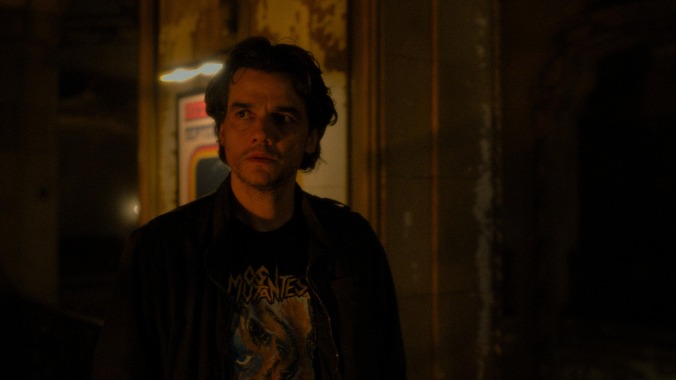Shining Girls' Elisabeth Moss and Wagner Moura break down that time-twisting finale
The stars of Apple TV Plus' supernatural thriller talk about season one's complicated completion

[Editor’s note: Do not read on until you’ve watched the season one finale of Shining Girls that came out June 3.]
“I love the ending,” Elisabeth Moss tells The A.V. Club in a conversation about the Shining Girls’ season finale, “30,” which dropped today on Apple TV+. The metaphysical thriller wraps up its first season with a big win for Moss’ Kirby Mazrachi. And it’s been a damn long time coming. Moss’ quiet newspaper archivist spent eight episodes trying to overcome her traumatic assault by Harper (Jamie Bell) six years ago, putting her journalistic dreams on hold and struggling with her new time-bending reality. Since the attack, Kirby’s world has continued shifting—her pets, apartments, hairstyles, and romantic partners changing without notice, and with no clue as to why. Well, until recently.
Kirby figures out that each time Harper kills another woman—another shining girl—her own reality morphs and she experiences an alternate universe. It’s a complicated affair made even worse when Kirby finds a soul sister in Jin-Sook, a.k.a. Jenny (Phillipa Soo), a fellow survivor. Witnessing the chaos Harper leaves behind, including her murdered friend and teammate Dan Velazquez (Wagner Moura), pushes Kirby into hunting down the killer. In “30,” she finally finds the house Harper uses as a portal to murder women over various time periods. Kirby then turns Harper’s weapon against him to kill him off.
Moss is a fan of the poetic justice in the way Kirby exacts revenge and keeps the house for herself. “I love it because it’s so complicated,” the show’s actor-producer-director says. Despite getting exactly what she wants, Kirby now has to navigate what’s next. “She does win,” Moss says. “She gets the house, and most importantly she gains control of her own reality and narrative, which is what it’s always been about for her. But…”
Series creator Silka Luisa really didn’t want to tie it all up in a neat bow, according to Moss. “And that’s what the final scene represents,” she explains. “Kirby is in control, sitting on the couch, but has no idea what her life looks like now. [She has] a look of fear and trepidation, [asking] questions like, ‘Who am I now?’ and ‘Who is the person who has this house?’ That’s what we wanted to end with, and I appreciated it.”
Kirby also experiences another big loss just before the finale. As mentioned, in episode seven, “Offset,” Harper stabs Dan to death as Dan’s young son sits outside in a car waiting for him. Moura said he didn’t see his character’s demise coming until he read the script, but that it fit with the themes of the show. “It’s a series where anything can happen,” Moura says. “In Dan’s case, it felt right because he made the case personal and less about his journalistic ambition of getting his column back. He cares for Kirby, he wants to help her, and Harper can see that. So he kills Dan to punish her and their deeper relationship.”
Moura, known for playing Pablo Escobar for two seasons on Netflix’s Narcos, admits that he hates dying onscreen. “But in this case, it made sense, especially because the show has time travel and, like I said, anything can happen.” Dan dies in one universe, but with Kirby’s ability to use the house, she briefly meets him in another where he’s alive before the show’s end credits. Still, Shining Girls doesn’t expand on the sci-fi aspect or how the house works as a portal. Moss and Moura both agree that’s not the meat of the show, though, and they say that it’s always been about Kirby’s recovery and stopping Harper. “What I love about that aspect is it’s unclear but the audience experiences it along with Kirby, who’s just as confused,” Moura explains. “So we’re confused with her and take it all in as she does.”